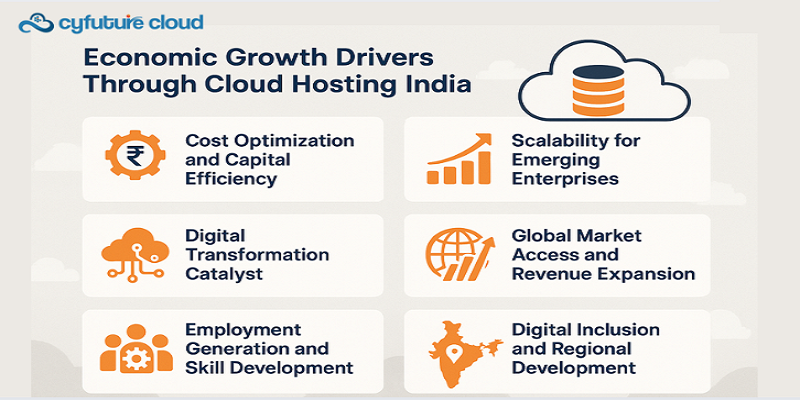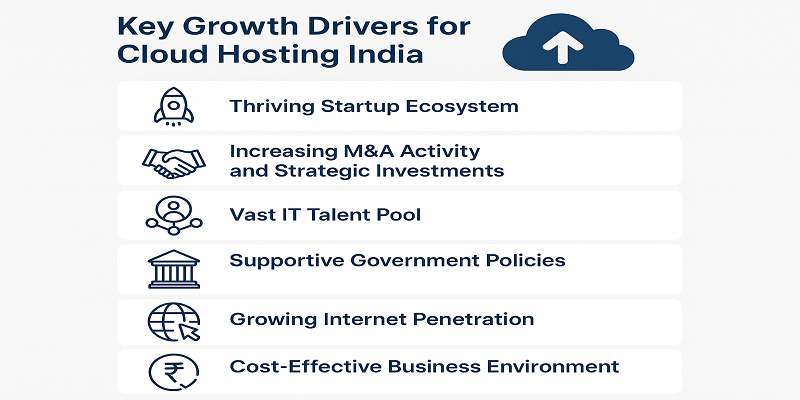Table of Contents
- India’s Digital Renaissance and Economic Resilience
- The Current Cloud Computing Landscape in India
- Market Opportunity and Growth Potential
- Understanding the Cloud Hosting Revolution
- Economic Growth Drivers Through Cloud Hosting India
- Strategic Infrastructure Development Through Data Centers
- Key Growth Drivers for Cloud Hosting India
- Business Continuity and Risk Management
- Future Outlook and Strategic Positioning
- Conclusion: Cloud Hosting India as the Foundation of Economic Progress
India’s Digital Renaissance and Economic Resilience
In today’s interconnected world, Cloud Hosting India has emerged as more than just a technological solution—it represents the backbone of India’s remarkable economic transformation. As the nation continues its journey toward becoming a global technology powerhouse, cloud hosting services are driving unprecedented growth, innovation, and digital inclusion across every sector of the economy.
India’s economic resilience has been nothing short of extraordinary. Despite global uncertainties, the Indian economy demonstrated remarkable strength during FY22, with leading economists positioning India as a ‘positive outlier’ in the global landscape. The nation is poised for substantial 6.7% growth, significantly outperforming other G20 economies—a testament to the robust digital infrastructure that Cloud Hosting India provides.
The Current Cloud Computing Landscape in India
Market Opportunity and Growth Potential
While Cloud Hosting India has shown impressive growth, the opportunity ahead is immense. Current cloud spending as a percentage of India’s GDP remains significantly lower compared to mature markets like the United States and Singapore, indicating vast untapped potential. This gap represents not a limitation, but an extraordinary opportunity for exponential growth.
Industry projections reveal that sustained 25-30% growth in cloud spending over the next five years could propel the market to US$18.5 billion, unlocking India’s full cloud potential. The adoption patterns vary across sectors:
- Cloud-native sectors (E-Commerce, Fintech): Leading digital transformation
- Cloud-progressing domains (Financial Services): Accelerating adoption
- Cloud-aspiring areas (Government, Manufacturing): Emerging opportunities

Understanding the Cloud Hosting Revolution
Cloud Hosting represents a fundamental shift from traditional on-premises infrastructure to internet-based computing resources. This transformation enables businesses to access scalable cloud computing power, storage, and applications on-demand, creating a more agile, cost-effective, and efficient technology ecosystem.

Economic Growth Drivers Through Cloud Hosting India
Cost Optimization and Capital Efficiency
Cloud Hosting India eliminates the need for substantial upfront infrastructure investments, allowing businesses to redirect capital toward innovation, research, and market expansion. This cost efficiency is particularly crucial for India’s thriving startup ecosystem and SME sector.
Scalability for Emerging Enterprises
The scalable nature of Cloud Hosting provides startups and SMEs with enterprise-grade infrastructure capabilities without the associated capital burden. This democratization of technology resources has been instrumental in India’s recognition as the world’s third-largest tech startup ecosystem, with over 25,000-27,000 active startups.
Digital Transformation Catalyst
Cloud Hosting India serves as the foundation for comprehensive digital transformation across industries. Organizations leveraging cloud technologies demonstrate enhanced competitiveness, agility, and innovation capacity—essential attributes for thriving in today’s dynamic market environment.
Global Market Access and Revenue Expansion
Through Cloud Hosting India, businesses gain seamless access to global markets. Ecommerce platforms, SaaS solutions, and digital services can reach international audiences efficiently, significantly expanding revenue opportunities and positioning India as a global service provider.
Employment Generation and Skill Development
The expansion of Cloud infrastructure creates substantial employment opportunities across multiple domains:
- Cloud architecture and engineering
- Cybersecurity and data protection
- IT management and operations
- Digital marketing and e-commerce
- DevOps and automation
Digital Inclusion and Regional Development
Cloud Hosting India ensures that businesses in remote and underserved regions can access world-class computing resources, reducing regional disparities and fostering inclusive economic growth. This democratization of technology access is crucial for India’s comprehensive development strategy.
Strategic Infrastructure Development Through Data Centers
Data Center Expansion and Investment
The growth of Cloud Hosting India has catalyzed significant infrastructure development, particularly in technology hubs like Noida. Major global cloud providers have announced substantial investments:
- Microsoft: ₹16,000 crores investment for three additional data centers in Hyderabad
- AWS: $4.4 billion investment commitment through 2030
- Google: $10 billion comprehensive investment in India’s digital infrastructure
Foreign Investment and Technology Partnerships
The expansion of Cloud Hosting infrastructure attracts substantial foreign investment, creating a positive cycle of economic growth, technology transfer, and international collaboration. This influx of capital strengthens India’s position as a preferred destination for global technology investments.
Key Growth Drivers for Cloud Hosting India

Thriving Startup Ecosystem
India’s startup landscape, featuring 1,400 newly funded tech startups in 2022 alone, relies heavily on Cloud Hosting India for scalable, cost-effective infrastructure. Success stories like Freshworks demonstrate how cloud-native approaches enable Indian startups to achieve global success.
Increasing M&A Activity and Strategic Investments
The growing M&A activity in India’s tech sector, supported by robust Cloud infrastructure, creates opportunities for expansion, talent acquisition, and technology integration. This trend reflects international confidence in India’s digital capabilities.
Vast IT Talent Pool
India’s extensive pool of IT professionals, combined with the scalable infrastructure provided by cloud, creates a powerful combination for delivering world-class technology services globally. The nation’s educational system consistently produces highly skilled professionals capable of leveraging cloud technologies effectively.
Supportive Government Policies
Government initiatives like Digital India and Make in India create a favorable environment for Cloud Hosting India adoption. Special Economic Zones (SEZs) and technology parks provide additional incentives for cloud service providers and businesses to establish operations in India.
Growing Internet Penetration
With over 700 million internet users and rapidly growing digital adoption, India presents an enormous market for Cloud Hosting India services. This expanding digital population drives demand for cloud-based applications, services, and solutions.
Cost-Effective Business Environment
India’s competitive cost structure, combined with the efficiency gains from Cloud Hosting India, creates compelling value propositions for both domestic and international businesses. This cost advantage, coupled with high-quality service delivery, positions India as a preferred global technology partner.
Business Continuity and Risk Management
Disaster Recovery and Operational Resilience
Cloud Hosting India provides robust disaster recovery capabilities, ensuring business continuity during unexpected disruptions. This reliability is crucial for maintaining economic stability and minimizing losses during challenging periods.
Environmental Sustainability
Leading Cloud Hosting India providers are adopting green technologies and sustainable practices, aligning with global environmental consciousness while reducing operational costs. This environmental responsibility enhances India’s appeal to international investors and customers prioritizing sustainability.
Future Outlook and Strategic Positioning
Emerging Technologies Integration
Cloud Hosting India is evolving to incorporate cutting-edge technologies:
- Artificial Intelligence and Machine Learning platforms
- Edge computing capabilities
- Internet of Things (IoT) infrastructure
- Blockchain and distributed ledger technologies
Global Technology Leadership
As Cloud Hosting India continues expanding, the nation is positioning itself as a global technology leader, not just a service provider. This transformation from a cost-effective option to an innovation hub represents a significant economic evolution.
Conclusion: Cloud Hosting India as the Foundation of Economic Progress
Cloud Hosting India has transcended its role as a mere technology service to become the fundamental infrastructure supporting India’s economic transformation. It enables cost efficiency, drives innovation, creates employment opportunities, and facilitates global market access—all essential elements for sustained economic growth.
As India advances toward its goal of becoming a $5 trillion economy, Cloud Hosting India will continue serving as the vital engine powering this unprecedented transformation. The technology is not just supporting current business needs; it’s building the foundation for India’s digital future, ensuring the nation remains competitive and innovative in the global economy.
The journey ahead is promising. With continued investment in Cloud infrastructure, supportive government policies, and a thriving ecosystem of businesses and startups, India is well-positioned to leverage cloud technologies for sustained economic prosperity. Cloud Hosting India isn’t just part of the economic growth story—it’s writing the next chapter of India’s technological leadership on the global stage.
Recent Post
Send this to a friend

 Server
Colocation
Server
Colocation CDN
Network
CDN
Network Linux
Cloud Hosting
Linux
Cloud Hosting Kubernetes
Kubernetes Pricing
Calculator
Pricing
Calculator
 Power
Power
 Utilities
Utilities VMware
Private Cloud
VMware
Private Cloud VMware
on AWS
VMware
on AWS VMware
on Azure
VMware
on Azure Service
Level Agreement
Service
Level Agreement 





















